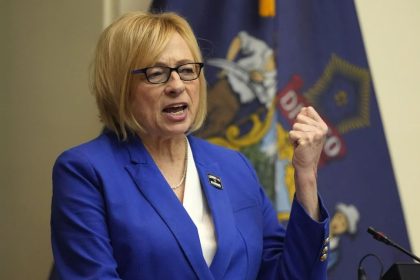Poll Shows Youngkin Gaining in Virginia Governor’s Race, Redistricting Delays

With just two critical weeks to go before Election Day, Republican Glenn Youngkin has pulled into a statistical dead heat with Democrat Terry McAuliffe. A widening partisan gap in voter engagement and an apparent shift in issue priorities are bolstering the GOP newcomer, a new poll says.
The latest Monmouth University Poll, released Wednesday, finds Youngkin and McAuliffe having identical levels of support among all registered voters. This poll is the first time Monmouth’s models have shown a possible Youngkin win.
Currently each garners the support of about 46% of that pool of voters, but the finding is a marked shift from other recent Monmouth polls, which showed McAuliffe with a steady 5-point lead in both August and September.
Since then, however, Youngkin has stepped up his attacks on the former governor, particularly in advertisements assailing the Democrat’s stand on education — namely that school boards should decide local curriculums, not parents.
After McAuliffe repeated that assertion during a September debate with Youngkin, the Republican put out a TV ad edited to suggest the Democrat thought parents should have no say in their childrens’ education.
To counter, McAuliffe launched a series of ads painting Youngkin as an extremist while this Monmouth poll was still being conducted.
Youngkin’s thrust on education, as well as his attacks on face masks and COVID vaccination mandates, has helped him increase his support in the reddest part of the commonwealth — western Virginia — where he currently leads McAuliffe by 39 percentage points.
At the same time, this latest Monmouth poll suggests that McAuliffe’s support has slipped a bit in heavily-blue northern Virginia. McAuliffe currently leads Youngkin in these communities 58% to 34%, but Youngkin has gained five points in the region in the past month.
McAuliffe also holds small leads in both the eastern Tidewater (48% to 42%) and central I-95/Richmond (48% to 41%) areas, the poll found.
The biggest swing in support over the past month comes from independent voters, registering a 48% to 39% lead for Youngkin now compared with a 37% to 46% deficit in September, the pollster said.
Youngkin has also cut into McAuliffe’s advantage with women voters. The Democrat currently has a narrow edge among women (47% to 43%), down from a sizable 14-point lead last month (52% to 38%), the poll shows.
Despite all these shifts, the pollsters at Monmouth said Wednesday their electoral models suggest it’s still anybody’s race. When information from past polls was entered into probabilistic models, McAuliffe always won, with leads ranging from a low of 2 points to a high of 7 points.
Based on this latest poll, some outcome models predict McAuliffe winning by three percentage points, and others say Youngkin will win by the same margin.
A traditional “cut-off” model similar to one Monmouth used in elections prior to the 2018 midterm – which includes registered voters who cast a ballot in at least two of the last four general elections and report being “certain” or “likely” to vote, or have already voted – shows a close contest with 48% for McAuliffe and 46% for Youngkin.
Interviewed prior to the release of the poll, Alex Keena, an assistant professor of Political Science at Virginia Commonwealth University, attributed Youngkin’s apparent rise in the polls to “the GOP dusting off its old playbook of scaring (White) people in order to drum up enthusiasm.
“It’s worked in the past, but not in the recent past,” Keena said in an email to The Well News.
He went on to note that Republicans haven’t won a statewide contest in Virginia since 2009.
“This is in part because the state is trending blue, but also because the state Republican Party has not succeeded in mobilizing people of color and people under 40,” Keena said. “The party has nominated Trump-endorsed candidates in the past, yet Trump is toxic here, and ‘Trumpism’ turns off a lot of folks who rely on federal government spending along the I-95 corridor.”
And yet, Keena said, “McAuliffe is not a very strong candidate in terms of personal appeal or grassroots energy. A large chunk of his money has flowed from cities out of state. This is true of Youngkin, to a lesser extent, who has loaned his own campaign millions.”
Virginia’s Other Political Issue — Redistricting
While the gubernatorial contest is rolling toward a nail-biting finish, another extremely important political process appears to be grinding to a halt.
The Virginia Redistricting Commission, a body made up of four Democratic state legislators, four Republican legislators, and eight citizen members, failed to meet an Oct. 10 deadline to submit newly crafted state legislative maps to the General Assembly.
Now it appears poised to miss a second deadline, this one for the Commonwealth’s new congressional district map.
On Monday, the latest meeting of the commission dissolved into acrimony when State Del. Marcus Simon, a Democrat, revealed a map submitted by former U.S. Rep. Tom Davis, R-Va. — and one that looked a lot like the map the panel was then debating — was drawn with considerable input from the National Republican Redistricting Trust.
Committee staff was immediately tasked with finding out what happened and if the maps were in fact the product of the same process, setting up the possibility that the panel will fail to meet its deadline for submitting a congressional district map as well.
Though each blown deadline comes with its own 14 days grace period, the committee could very well miss both of those as well. If it does, the process of redrawing the Commonwealth’s new districts will be left to the state Supreme Court, the majority of whom’s members were appointed by the Republican-controlled legislature.
Liz White, executive director of OneVirginia2021, a nonpartisan group that has worked for redistricting reform since 2013, said a constitutional amendment passed to create the new redistricting body “pretty much sets its structure,” but “a lot of the logistics, the practicalities of how it navigates the redistricting process was left to the members themselves.”
“It’s frustrating,” she said. “I know the commission hasn’t necessarily worked the way we had hoped. Maybe it hasn’t worked the way the commissioners hoped. But I will say, they don’t really have a comparable roadmap to follow,” White said.
According to White, Virginia is the first state to go through a process of getting the legislature to give up its map-drawing power without holding a public referendum.
“That’s how we wound up with legislators on the commission, and while some would say that’s less than ideal, it was the most reform we could do at the time,” she said.
“It’s certainly better than the old system,” White continued. “I think we all agree we solved the problem we wanted solved, which was one-party control of the map-making process, but I think what we’re seeing is there’s room for further reform to establish more independence and transparency.”
White said she believes commission members are working in a “well-intentioned way,” but said the process has proven somewhat untenable.
“Initially the idea was to have one chairman appointed from one of the citizens on the committee; instead they opted to have co-chairs, one Republican and one Democratic, and they hired two sets of counsel and two sets of mapmakers,” she said.
“Each mapmaker came up with their own set of maps that the commissioners could compare and contrast, but all of those individual decisions built on each other and there ended up being no clear way to get back to a consensus,” she added.
White said everyone who supported the redistricting amendment “really hoped” partisanship would be put aside “enough” to find a middle ground, but she said she’ll be comfortable if in the end the whole process does wind up with the state Supreme Court.
“I think courts have a good record when it comes to drawing maps,” she said. “There’s really no history of judicial gerrymanders, so I think that we’ll get fair maps out of the courts.”
Professor Keena said one of the problems with how Democrats have grown in Virginia is that while the party continues to grow as a force in the state, this growth is “disproportionately occurring in Northern Virginia and in dense population urban areas, and the suburbs.”
“This means that when redistricting experts draw tight, compact districts, they end up creating a bias that hurts Democrats, and communities of color often as well,” he said.
As for the commission’s inability to approve maps in a timely fashion, Keena said he believes, “in some ways, the Democrats in the Virginia Redistricting Commission shot themselves in the foot when they agreed with Republicans at the beginning of redistricting to start with a ‘clean slate’ of districts.”
“They basically said, ‘burn the old districts and build brand new ones,’ and sought ‘party neutrality,’ which means commissioners can’t evaluate the political impact of the maps,” he said.
“This was a terrible idea, in my opinion, and it sowed the seeds of conflict and division,” Keena added.
A Last Look at the Latest Polling
As mentioned above, the Monmouth poll identified a recent shift in voter issue priorities and says that shift has helped Youngkin.
The top issues chosen as the most important first or second factor in Virginians’ vote for governor are jobs and the economy (45%, up from 39% in September) and education and schools (41%, up from 31%).
Just 23% named the COVID pandemic as one of their top two issues, which is a drop from 32% last month.
In a sign that his negative ads may be working, Youngkin has drawn even with McAuliffe on being trusted more to handle education and schools (39% to 38%). He trailed the Democrat on this issue in September and August.
The Republican also now holds a small trust advantage on jobs and the economy – 39% to 34%, and Monmouth’s pollsters say he’s widened his advantage on handling taxes (40% to 30%), while remaining even with McAuliffe on handling the issue of abortion (33% Youngkin to 35% McAuliffe).
Youngkin currently earns a better personal rating – 41% favorable to 29% unfavorable – than McAuliffe does – 39% favorable to 39% unfavorable. The Republican’s numbers are similar to his rating last month (40% to 31%), while the Democrat’s numbers have worsened since September (40% to 33%), another sign the negative ads targeting him may be working.
The Monmouth University Poll was conducted by telephone from October 16 to 19, 2021 with 1,005 Virginia registered voters. The question results have a margin of error of +/- 3.1 percentage points. The poll was conducted by the Monmouth University Polling Institute in West Long Branch, New Jersey.
Dan can be reached at [email protected] and at https://twitter.com/DanMcCue.























